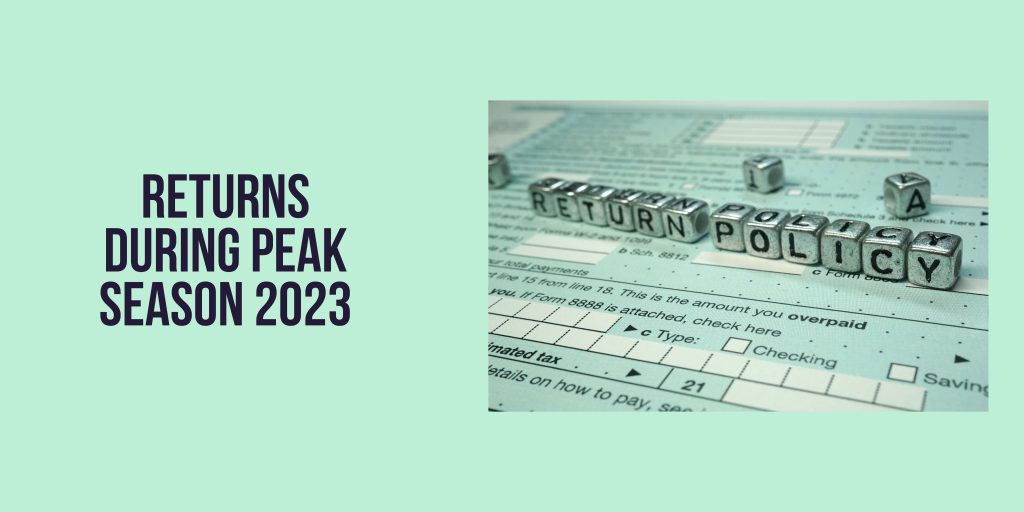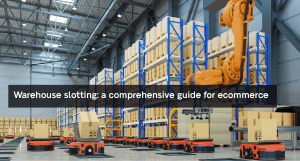E-commerce Peak Season typically occurs from October to December, and online retailers usually experience a surge in sales during key shopping events like Christmas, Black Friday, and Cyber Monday. However, a rise in sales equals a rise in returns. A survey by Shopify observes that most returns are in January (80.65%), followed by December (3.23%) and February or later (4.84%).
Returns are an important aspect of the e-commerce experience, making it unique and convenient for customers. This is why retailers should pay particular attention to them. By introducing effective inventory management and streamlined fulfillment processes, businesses will no longer view peaks in returns with dread but will value them as customer satisfaction enhancement opportunities.
By now, as a retailer, you’ll be thinking: “Yes but returns affect my daily operations negatively”. But don’t forget that your return policy has a crucial role in purchase decisions, with 56% of consumers deterred by inconvenient return policies.
In general, to turn returns into something positive, you should aim to develop a strategy where operational disruptions are minimum, focusing on customer satisfaction. Ultimately, your business’s bottom line will benefit from it.
Managing e-commerce returns effectively, especially during the peak season, means developing both proactive and reactive strategies. Here are some key approaches to streamline your e-commerce return process.
Reduce reasons for returns
The first step is tackling the problem at its core: minimise reasons for returns. The most common return reasons are usually wrong sizes or products not corresponding to their descriptions. This means you can improve your customers’ shopping experience by uploading top-quality product images, under which you should insert detailed product descriptions and sizes. Furthermore, include reviews under your products so that customers can read about other people’s experiences and have a better idea of what they are buying.
Packing and shipping must be spot on
A frequent cause of e-commerce returns is product damage during shipping. Fortunately, this risk can be mitigated by implementing an efficient pick and pack process in your warehouse. Using pick lists to ensure that the correct item is selected, conducting thorough product quality inspections, and choosing suitable packaging options, are all effective measures to ensure customers receive the product they ordered in its best condition.
Clear returns policy and convenient return options
For an e-commerce business It’s vital to have a straightforward and convenient return policy because it builds trust and encourages purchases; customers need to be sure that they have nothing to lose if they buy online. Provide clear and simple instructions, where you highlight conditions for returns and who covers return shipping costs. Of course, offering free returns will increase customer satisfaction and the likelihood of purchases on your online store. Make sure your returns policy is convenient; offer extended time frames for returns, include information on refunds and make sure your policy is easily found, such as by linking it on product pages. To make returns as easy as possible for your customers, consider including return labels with orders.
Update customers regularly on return status and process refunds promptly
During Peak Season, don’t neglect communication. Keeping customers informed about the status of their returns will reassure them and encourage them to buy from your store again. Partnering with a third-party logistics (3PL) provider will streamline these operations for you, making processing times faster and providing automatic real-time updates. In fact, investing in reverse logistics can turn returns into an opportunity rather than a loss.
Furthermore, while it is challenging during peak times to process refunds swiftly you must integrate a strategy to do so. Quick refunds not only free up customer funds for potential new purchases but also allow for faster restocking and resales.
Cross-border returns centres
If your business ships internationally, handling returns across borders can be extremely challenging. Partnering with a 3PL that handles cross-border returns for you means they will receive and hold returned items in their local warehouses until another order is placed there, allowing for the resale of returned items within that region and at lower costs.
Predictive restocking
Tracking returned packages in real-time and adding them back into inventory is particularly beneficial for fast-selling items during peak season, ensuring you don’t miss sales opportunities due to unexpected out of stocks.
Partnering with a Third-Party Logistics Provider (3PL)
If a 3PL handles returns for you, you will experience substantial cost saving and operational improvements, especially during Peak Season, when order volumes surge and become challenging to handle. During such busy times, it is not uncommon for customers to be dissatisfied, due to delays or inefficiencies in handling returns. A 3PL streamlines the returns process, mitigating these issues by offering specialized tools and means to manage returns efficiently. Partnering with a 3PL like eLogy will help maintain customer satisfaction and improve the profitability of your online store.
- Streamlined return operations
- Manage returns easily and automatically
- Automatic return labels
- Real time tracking
- Inventory management to aid just in time replenishment
- Carrier integration + AI optimised route planning
- Strategic warehousing to ensure proximity to key markets and reduce returns times+costs
- Data analysis to monitor performance and craft strategies





